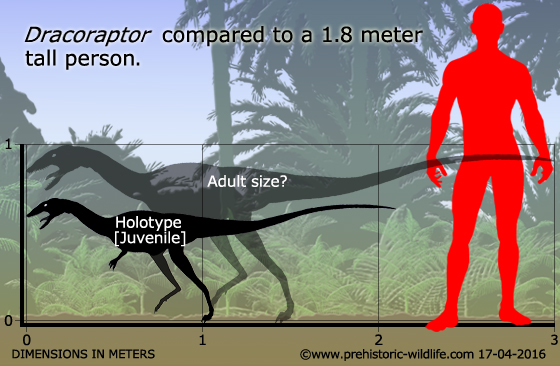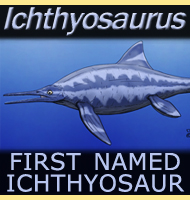


Dracoraptor

Name:
Dracoraptor
(Dragon hunter/thief).
Phonetic: Dray-coe-rap-tor.
Named By: D. M. Martill, S. U. Vidovic,
C. Howells & J. R. Nudds - 2016.
Classification: Chordata, Reptilia, Dinosauria,
Saurischia, Theropoda.
Species: D. hanigani (type).
Diet: Carnivore.
Size: Holotype estimated to have been 2.1 meters
long, however this was a juvenile at the time of death. Adults
may have been up 3 meters long.
Known locations: Wales - Blue Lias Formation.
Time period: Hettangian of the Jurassic.
Fossil representation: Partial skull and partial
post cranial skeletal remains.
An
interesting little dinosaur, Dracoraptor was a
small theropod
dinosaur that roamed around what is now Wales during the early
Jurassic. The holotype (first found) individual of Dracoraptor
has been reconstructed at just over two meters in length, however,
the holotype was a juvenile animal, and adults would have been
larger. Dracoraptor was lightly built, with
long legs that would
have allowed for a high running speed, enabling Dracoraptor
to chase
down swift moving prey. The small size and build however meant that
Dracoraptor would have been limited to hunting
smaller animals.
Fossils
of the first individual of Dracoraptor were
recovered in 2014 by
Nick and Rob Hanigan, two brothers who are also amateur
palaeontologists who were searching a cliff face for fossils of
ichthyosaurs.
Later in 2015, more fossils were found by a student
named Sam Davies. The fact that fossils of Dracoraptor
have been
found in a deposit known for marine creatures would indicate that at
least one individual of Dracoraptor had been swept
out to sea and then
buried in marine sediment. Assuming that an individual/s was not
swept out to sea by a river, it may be that Dracoraptor
were known to
hunt animals and scavenge carrion on the shoreline, effectively being
beachcombers.
Further reading
- The oldest Jurassic dinosaur: a basal neotheropod from the
Hettangian of Great Britain. - PLoS ONE 11(1):e0145713:1-38.
- D. M. Martill, S. U. Vidovic, C. Howells &
J. R. Nudds - 2016.
----------------------------------------------------------------------------
Random favourites
 |
 |
 |
 |




